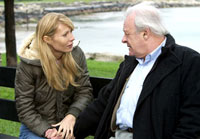Proof is such a nice little film that you almost wish it didn’t come with such a weighty pedigree. The film is based on a Pulitzer-winning play by David Auburn, who wrote the screenplay with Arthur Miller’s daughter Rebecca. The film stars Oscar winners like Anthony Hopkins and Gwyneth Paltrow, the latter of whom is here reunited with director John Madden for the first time since their prize-winning collaboration on Shakespeare in Love. Add to this the fact that the film is about mathematicians who fear for their sanity, and the viewer could be forgiven for expecting another mind-expanding opus like A Beautiful Mind or Pi.

Proof does touch on big ideas, but very lightly, and whatever concern it expresses for the mind is ultimately channeled towards the heart. This may be a film about intellectuals, but it is not an intellectual film. The story concerns a math student named Catherine (Paltrow) who has put her education on hold to look after her father, Robert (Hopkins), a once-brilliant mathematician whose career came to an end due to the onset of dementia. The film begins shortly before Robert’s funeral, which happens to coincide with Catherine’s 27th birthday. Robert is dead, but Catherine still sees him and talks to him occasionally, which is one of a few things that cause her to wonder if she has inherited his tendency towards madness. And since most mathematicians do their best work by their mid-20s, Catherine also faces the possibility that there may be no point in going back to school. She may be preparing for her father’s funeral, but her own life might just as well be over, too.
Catherine’s reclusive, anti-social tendencies are not helped by the presence of two other people in her father’s house. Hal (Jake Gyllenhaal), a math teacher who was once Robert’s dissertation student, pores through the hundred-plus notebooks filled with Robert’s ramblings in search of something, anything, that might have been the late professor’s one last meaningful contribution to the field. Catherine regards this with an attitude that wavers between dismissive and paranoid; she highly doubts that her father did write anything useful, but if he did, she suspects Hal will try to steal it and pass it off as his own. Meanwhile, Catherine’s sister Claire (Hope Davis) comes back to Chicago from New York, ostensibly for the funeral but also to nudge Catherine into starting a new life.

In the original stage play, these four people were the only characters, but the film wisely opens things up just a tad, particularly in a flashback to Catherine’s own brief experience as a student under one of her father’s colleagues (Roshan Seth). It also shifts some of the other flashbacks around in a way that makes good use of film’s ability to slip back and forth in time. It also makes one of the story’s central mysteries more involving.
Some of the character quirks are nicely developed. Hal, it turns out, plays in a rock band comprised of math geeks; one of their best and most amusing tunes, if it can be called that, is an utterly minimalist in-joke. Claire is a bit of a control freak, who pesters her sister with questions and recommendations regarding her diet, her hair, and her attire, but Davis manages to wring some humanity out of her. One of the film’s more amusing ironies is that Claire insists on hosting a party on the night of the funeral, despite Catherine’s objections, but it is Claire who wakes up with a bad hangover, while Catherine experiences one of her few moments of happiness, thanks to a breakthrough in her relationship with Hal.
The title refers to a mathematical process for explaining and defending theorems, but it also refers to matters of trust, and thus of faith, at least in the non-religious sense of the word. Things can be “proved” in mathematics by lining up the right equations, but in almost every other part of life, there is room for at least some doubt and thus for a belief that goes beyond what can be proved. Without giving too much away, a significant part of the story hinges on the question of which character wrote a mathematical proof, and there is no way to prove who wrote it; there is only the evidence surrounding the proof, the claims made by certain people, and the interpretations that other people make of these things.

Before these characters can believe the claims made by each other, they must first believe in each other. And thankfully, the cast makes it fairly easy for us to believe in them, too. None of the actors stretch their range all that much, but they are still capable of conjuring up some quietly affecting moments. One such scene occurs when Robert and Catherine, who had thought they were collaborating on something, discover that they are actually on altogether different wavelengths. Alwin Kuchler’s cinematography and Stephen Warbeck’s music contribution gives some scenes, especially the flashbacks, a nice dreamy feel.
The one major drawback, alas, is the film’s central metaphor, or rather, how it makes use of that metaphor. The film, like Auburn’s play, just isn’t interested in mathematics all that much; characters talk about how this or that will be the biggest thing since sliced variables, or whatever, but we never get even a taste of the thinking that lies behind these claims. To some viewers, this might seem a little like making a movie about the love life of Shakespeare that doesn’t display any interest in his plays or poems. On that level, this film is inferior to Madden and Paltrow’s previous joint venture. But as a story about personal and family dysfunction, and about coming to terms with life’s uncertainties, Proof isn’t bad.
Talk About It
Discussion starters- How do you prove things? Is it possible to prove anything, outside of mathematics? What role do you give to forms of evidence, such as physical objects and personal testimonies?
- What role does trust play in your relationships? How do you know who to trust, and when? How do you earn the trust of other people? Is anybody in this film completely trustworthy? Does anybody fail to trust someone else when he or she should have trusted that other person? Point to examples where people prove their trustworthiness, or betray the trust that others have placed in them.
- Which of the sisters do you find it easier to identify with? Why? Did you find the other sister sympathetic too? Why or why not? Do you think they are trying to understand each other? What could each of them do to make their relationship work better?
The Family Corner
For parents to considerProof is rated PG-13 for some sexual content, language and drug references. There is one sex scene, but nothing explicit is shown. The language includes a few four-letter words and several instances of divine names being taken in vain.
Photos © Copyright Miramax Films
Copyright © 2005 Christianity Today. Click for reprint information.
What Other Critics Are Saying
James Mangold directed Gwyneth Paltrow all the way to Oscar glory in Shakespeare in Love. The pair are going for the gold again with Proof, an adaptation of David Auburn’s celebrated Broadway play of the same title.
This time, Paltrow ventures into Beautiful Mind territory, playing the daughter of a genius mathematician (portrayed in flashbacks by Anthony Hopkins). She’s troubled by the possibility that her father might have passed his madness on to her, and she finds comfort in the affections of a compassionate young man (Donnie Darko’s Jake Gyllenhaal). Proof is already earning some rumors of Oscar nominations from mainstream critics. Christian press critics aren’t enthusiastic, but they’re not rejecting the film either.
Stefan Ulstein (Christianity Today Movies) says, “Proof does touch on big ideas, but very lightly, and whatever concern it expresses for the mind is ultimately channeled towards the heart. This may be a film about intellectuals, but it is not an intellectual film.”
He adds, “The one major drawback, alas, is the film’s central metaphor, or rather, how it makes use of that metaphor. The film … just isn’t interested in mathematics all that much. … But as a story about personal and family dysfunction, and about coming to terms with life’s uncertainties, Proof isn’t bad.”
Stephen McGarvey (Crosswalk) writes, “While Proof is certainly no Beautiful Mind, it is certainly a poignant and thoughtful look at the supposed thin line between brilliance and insanity.”
Here’s proof that mainstream critics are divided over Mangold’s film.











